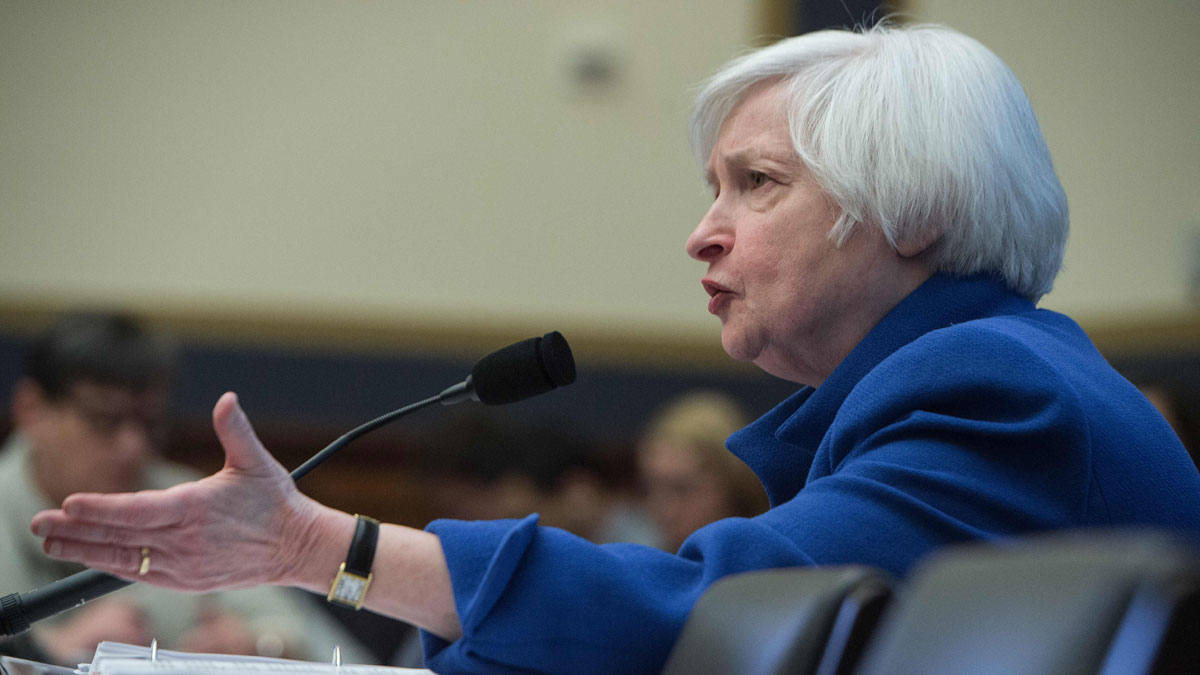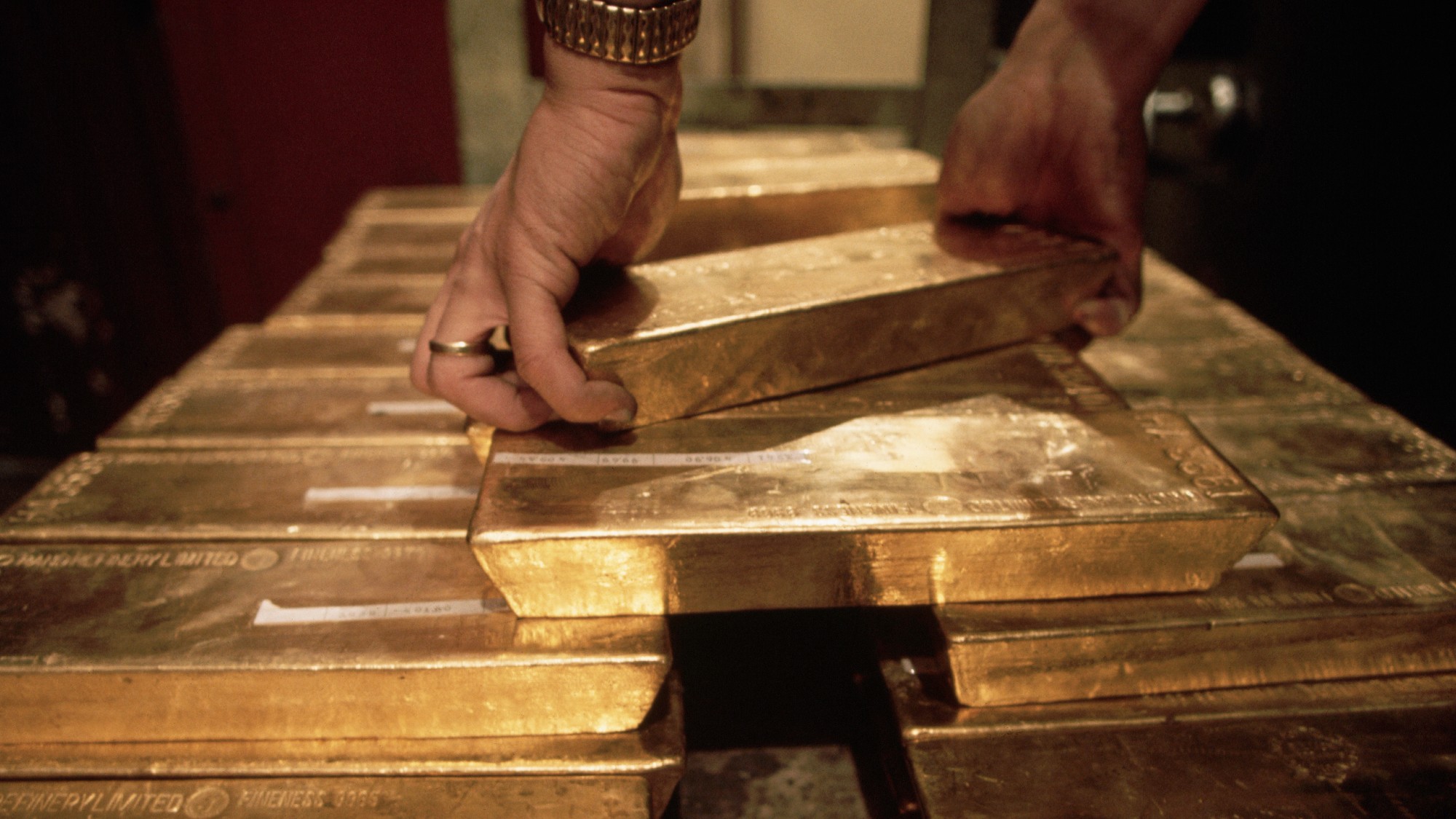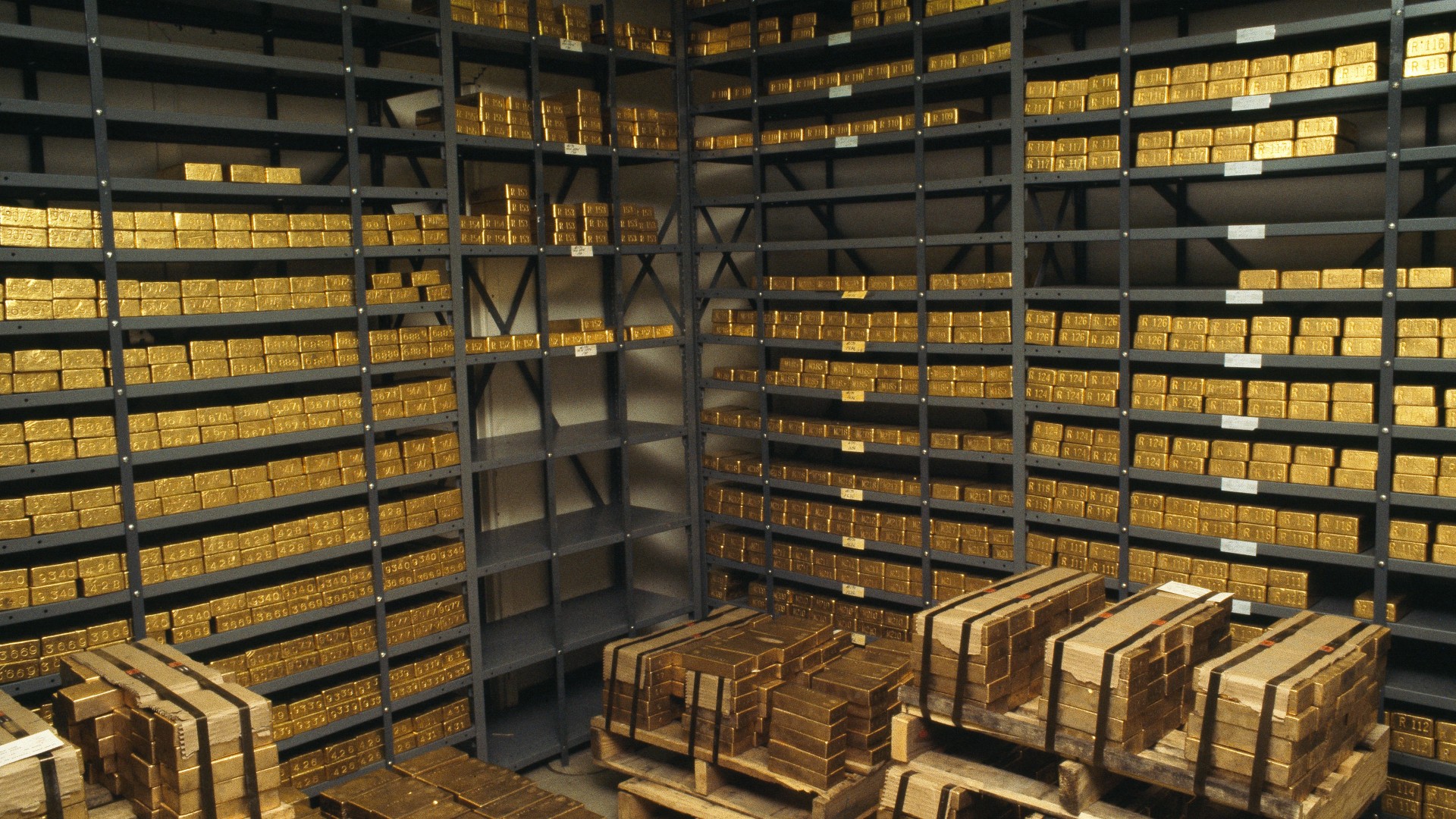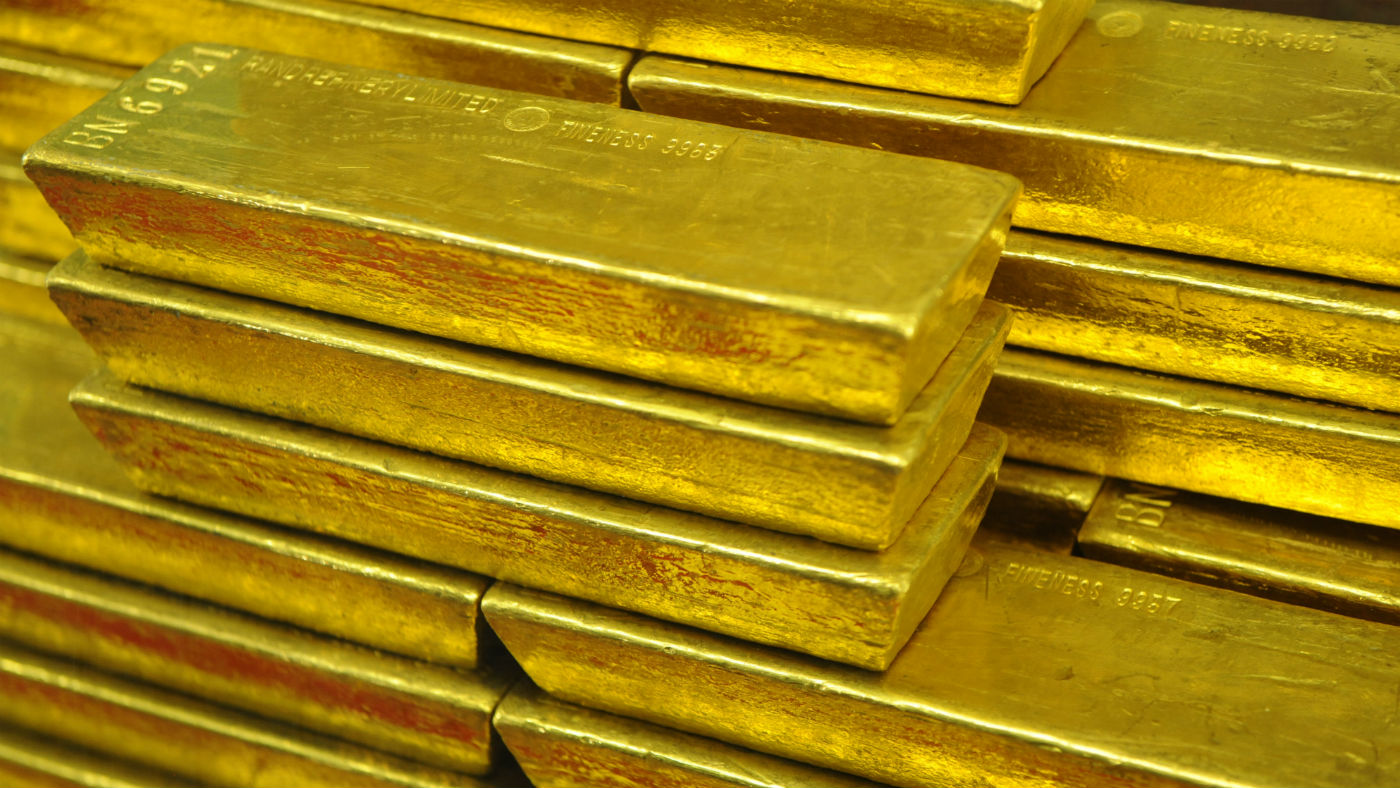Gold price waits for rates clues from Jackson Hole
Political turmoil in the US has the potential to 'help gold in the short and longer term'

A free daily email with the biggest news stories of the day – and the best features from TheWeek.com
You are now subscribed
Your newsletter sign-up was successful
Gold price edges higher after Brexit dents investor confidence
19 July
The gold price climbed a little higher today as investors chose security over uncertainty after Britain's vote to leave the European Union left a large dent in business confidence.
As European shares hit a one-week low, spot gold rose 0.3 per cent to $1,333.38 per ounce in early trading.
The Week
Escape your echo chamber. Get the facts behind the news, plus analysis from multiple perspectives.

Sign up for The Week's Free Newsletters
From our morning news briefing to a weekly Good News Newsletter, get the best of The Week delivered directly to your inbox.
From our morning news briefing to a weekly Good News Newsletter, get the best of The Week delivered directly to your inbox.
Gold has risen almost 25 per cent this year, reaching its highest level since March 2014 at $1,374.71 after Britain chose to leave the EU. Prices have since retreated slightly following news that the US economy is gaining strength.
The publication earlier this month of strong US employment data that points to a better outlook for the world's largest economy could have a further impact on the price of gold.
Nitesh Shah, head of commodity research at ETF Securities, told Reuters that stronger non-farm payroll figures give the US Federal Reserve more ammunition to raise interest rates, "which could damage gold in the short-term".
Gold is highly sensitive to interest rate rises, which lift the cost of holding non-yielding assets such as bullion while boosting the dollar in which it is priced.
A free daily email with the biggest news stories of the day – and the best features from TheWeek.com
Investors are now awaiting the outcome of the European Central Bank meeting in Frankfurt on Thursday, when ministers will discuss interest rates and monetary policy.
Last month saw a surge in gold buying in the UK after Brexit knocked investor confidence in the London property market, which has been considered a safe bet for the past 20 years.
Gold price falls after strong US jobs report
11 July
The spot price fell in early trading in London today due to stronger-than-expected data in a US jobs report published last week.
The price of gold was last at $1,358.83 per ounce at 11:15 BST, down $11.17 on the previous close. Trade has ranged from $1,357.43 to $1,373 so far.
On Friday, non-farm employment data showed that the US created 287,000 jobs last month, massively exceeding analysts' expectations.
Jobs watchers expected Friday's report to show a rebound from May's unexpectedly weak growth, but the June number has "easily topped expectations," says CNBC.
The data has "lessened immediate concerns about the health of the US economy," says Bullion Desk, "but market participants believe it was not strong enough for the Fed to lift rates in the next few months."
Most say that interest rates are likely to hold until at least June next year, according to CME Group FedWatch.
Other precious metals were fairly stable. Silver was last at $20.38 per ounce while Platinum was up $1.50 at $1,100.
"All the precious metals have run into some selling as this morning has progressed and, although gold and silver are looking robust, profit-taking remains a risk," FastMarkets's William Adams said.
Gold at two-year high and could hit $1,900 - or fall to $1,115
11 July
Gold surged to a new two-year high overnight and was holding its ground this afternoon in London, as central banks moved to adopt looser monetary policies designed to encourage growth after the shock of the Brexit victory.
In Singapore, the spot price hit a high of $1,352 an ounce and was hovering at around $1,350 in the final two hours of London's trading session.
Ahead of the result of the UK EU referendum on 23 June, when most people were still betting on a Remain victory, the gold price was almost $100 an ounce lower.
A widespread belief that the UK, EU and world economy could all suffer a sharp slowdown has prompted a rush to perceived safe havens such as gold, despite a rebound in traditionally negatively-correlated assets, including equities and the dollar.
Offsetting these factors is a growing view that interest rates, which are arguably the primary counterweight to gold, are set to stay lower for longer – and could even fall further.
On Friday, Bank of England governor Mark Carney signalled that UK interest rates could be cut to a new record this summer to boost demand.
The Wall Street Journal says it also expects action from the Chinese central bank in response to weak demand data. Elsewhere, the Bank of Japan could cut already negative rates again while the US Federal Reserve is expected to stand still until the effects of Brexit become clearer.
Higher rates tend to damage gold as they boost returns of rival assets and increase the opportunity cost of holding the non-yielding metal. Lower rates are almost always a boon to the gold price.
Given this accommodative policy position and ongoing economic uncertainty, gold could advance further in the coming weeks. Oversea-Chinese Banking Corporation is predicting a short-term rise to $1,400 an ounce.
Juerg Kiener, the chief investment officer of Swiss Asia Capital, told CNBC that the gold price could go on a prolonged rally and surpass its record level of $1,900 an ounce over the next 18 months.
On the other hand, a lack of focus on fundamentals and a greater focus on wider market sentiment means the price will remain volatile, says Credit Suisse's investment strategist Jack Siu. He's predicting gold will fall back to $1,115 over the next 12 months.
Gold price in record rise against pound after shock Brexit win
04 July
The gold price soared against the pound at the fastest pace ever overnight, says BullionVault, as it became clear the UK had voted to leave the EU.
In common with other assets and markets, the metal had been moving in line with strong expectations of a Remain win and dipped in the lead up to the poll, dropping as low as $1,255 an ounce. However, as results stacked up for Out, the price surged 22 per cent to a high of $1,360, the Daily Telegraph reports.
Gold's spot price has dipped since, but it’s still up strongly by four per cent, reaching $1,316 at around 12.15pm in London today, $3 above the fresh 2016 high of last week.
Gold is seen as a safe haven at times of market turmoil – and that is certainly a fair way to characterise today. The FTSE lost £120bn of its value before recovering slightly, the pound hit 30-year lows and markets as far away as Japan plummeted eight per cent.
Precious metals strategist Tom Kendall, of ICBC Standard Bank, said gold was also benefitting – and would continue to do so in the coming weeks – because, with the negative effects of Brexit on the global economy being watched closely, it is “now highly likely that the Fed will be unable to hike rates this year". Gold is typically negatively correlated with interest rates, as its opportunity cost is much higher during periods when alternative assets such as cash are organically accumulating value.
It seems the search for a safe haven was hitting ordinary savers too: Google revealed that the number of searches for the phrase "buy gold" spiked by 500 per cent last night. Investors can buy physical gold from the likes of BullionVault or the Royal Mint, or get access to bullion through an ETF that directly tracks the price.
Many might instead opt to trade in gold-mining shares, which tend to move in line with the gold price – and can even rise at an even faster rate. However, they are also prone to volatility like any other share. On the FTSE 100 this morning, Randgold Resource was one of the few risers, surging 20 per cent.
Gold price hit another high this week - how can you invest?
17 June
A retired engineer, known only as Ron, made the news this week for cashing in all his investments to buy £850,000 in gold bars. He's lost faith in the stock markets and has buried the treasure in his back garden for his family to find later.
Given the shaky nature of the stock markets and the big events on the horizon that could cause more upset – Brexit and the US election for a start – Ron could be forgiven for his Armageddon-like approach to his investments. After all, gold is traditionally seen as a safe haven asset that historically performs well when the stocks markets falter.
The gold price has already risen by 20 per cent this year - it hit a new 2016 high above $1,313 an ounce earlier this week - but it remains 30 per cent below the record high of $1,900 it reached in 2011. The spot price is hovering a little below $1,290 this afternoon, as stocks enjoy a respite rally at the end of a tough week.
So, if you want to add a bit of gold to your portfolio, what’s the best way to do it?
Well, don’t bury it in your back garden. It’s expensive – Ron had to hire a digger and requested the gold was delivered in batches when the weather was good so he could bury it – and it is very risky. There is unlikely to be an insurance company out there prepared to cover Ron’s gold stash.
If you want to hold physical gold you are better off choosing a company like BullionVault or the Royal Mint who will store your gold for you.
Physical gold has advantages as an investment. Firstly, you are getting direct exposure to the gold price that isn’t affected by secondary factors and costs. Secondly, there are tax benefits to buying physical gold: purchases of gold coins and bars are VAT-free and any profit you make on gold coins is exempt from capital gains tax.
The costs of investing in physical gold can be quite low too. Bullionvault charges 0.12 per cent a year for insurance and storage, while the average gold ETF charges 0.4 per cent a year.
One of the key drawbacks to physical gold is that it attracts no interest and so, while a safe store of value, its only way of accumulating value is gains in the gold price. In short, you don't buy bullion to build value - that would amount to a fairly speculative bet on the commodities market - but rather to hedge price volatility elsewhere in your portfolio.
Alternatively, you could choose to invest in a gold fund instead.
The benefit here is it is simpler as you can invest via your usual stock broker or investment platform. It also means you can hold gold within your pension – something which is possible with physical gold but very difficult to do. One of the most popular choices is the Blackrock Gold & General Fund, which charges an annual management fee of 1.75 per cent.
The problem with funds is they tend to invest in gold miners rather than directly in gold and this means they carry increased risk, as your investment will be affected by the individual performance of miners in the same way as any stocks-based fund. Traditionally, gold mining stocks lag the gold price when it is rising and fall faster when it drops.
A better option might be a gold ETF which directly tracks the gold price and are cheaper than gold mining funds with annual fees of 0.25 per cent-0.5 per cent. Two of the most popular are ETF Securities Gold Bullion Securities and iShares Physical Gold.
-
 Local elections 2026: where are they and who is expected to win?
Local elections 2026: where are they and who is expected to win?The Explainer Labour is braced for heavy losses and U-turn on postponing some council elections hasn’t helped the party’s prospects
-
 6 of the world’s most accessible destinations
6 of the world’s most accessible destinationsThe Week Recommends Experience all of Berlin, Singapore and Sydney
-
 How the FCC’s ‘equal time’ rule works
How the FCC’s ‘equal time’ rule worksIn the Spotlight The law is at the heart of the Colbert-CBS conflict
-
 What a rising gold price says about the global economy
What a rising gold price says about the global economyThe Explainer Institutions, central banks and speculators drive record surge amid ‘loss of trust’ in bond markets and US dollar
-
 Gold tops $4K per ounce, signaling financial unease
Gold tops $4K per ounce, signaling financial uneaseSpeed Read Investors are worried about President Donald Trump’s trade war
-
 Safe harbor: Gold rises as stocks sink
Safe harbor: Gold rises as stocks sinkfeature It's a golden age for goldbugs
-
 What rising gold prices can tell us about the economy in 2024
What rising gold prices can tell us about the economy in 2024The Explainer Market hits all-time high, boosted by a weakening US dollar and rising global tensions
-
 Gold’s ‘flash crash’: what the experts think
Gold’s ‘flash crash’: what the experts thinkfeature Bad news, good news and a loss of faith
-
 What is the price of gold and when is best to buy?
What is the price of gold and when is best to buy?Speed Read Economic and geopolitical uncertainty traditionally drives investors to reliable metal markets